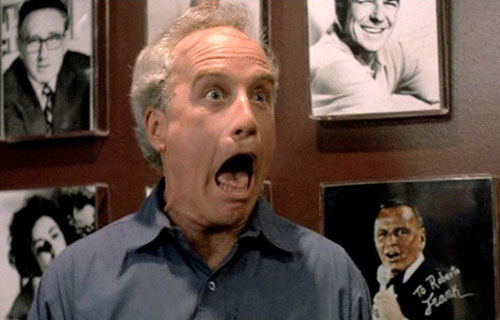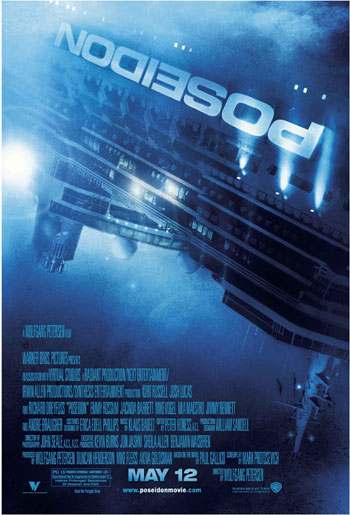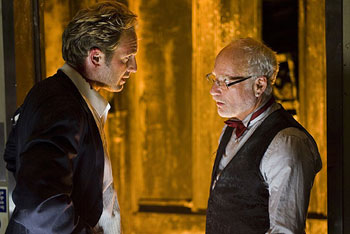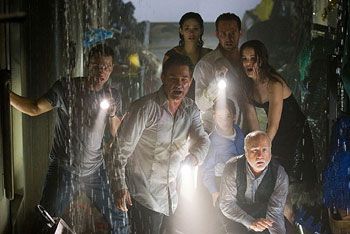
The last time I met Richard Dreyfuss things didn’t go well. It was on the set of Poseidon,
Wolfgang Peterson’s big budget remake of the 1972 camp disaster classic
about a huge cruise ship that gets turned upside down. You can read the whole encounter here,
but the short version is this – Dreyfuss punched me. It turned out for
the best, as many people have commented that the resulting piece was
the best thing I ever wrote. I even got some freelance work out of it,
so I guess I have to thank Dreyfuss for that.
A couple of months
ago I floated the idea of a rematch to my Warner Bros contact. Wouldn’t
it be great, I said, if Dreyfuss and I had another one on one?
Everybody loved the idea and I was flown to Los Angeles for round two.
Everybody
loved the idea except, of course, Dreyfuss. He turned down the one on
one (to be fair, he turned down almost all one on one requests, from
what I hear). The rematch, it seemed, would have to happen in the
crowded environs of a roundtable. And things didn’t start off strong –
when I introduced myself and asked him if he remembered me from the
set, Dreyfuss said:
Dreyfuss: Ah CHUD, yes. The wise-ass place. So useful.
Usually
I have a very specific rule when it comes to running roundtables –
namely that I don’t specify who asked what question. A roundtable, when
done well, is a team game. In this case, though, I will give you the
following information: I am 32, I know about the sinking of the Maine
and I asked the last question here. You should be able to figure out
which section has me and Dreyfuss conversating.
You’ll notice
that the last question doesn’t have an answer. That’s because it
couldn’t be transcribed. The response Dreyfuss gave me was physical,
and maybe I’m lucky that I was seated out of punching range – Dreyfuss
crossed his forearms in an x and gave me the finger with both hands.
Q: What was the real attraction for you to this film?
Dreyfuss:
Money. I mean it’s… Big surprise. I mean they offered like a lot of
money and I love money and didn’t have a lot and I thought this is a
good way of doing this.
Q: Your young co-star Jimmy Bennett says…
Dreyfuss: Yeah,
where is he? He should be here, man. He had one great moment in that
movie, boy – they cut out great moments of his more than anything.
Q: So what was the relationship that you guys had that obviously you guys really connected on, on the set – what was that?
Dreyfuss: What did he say?
Q: He said that out of everyone that he really connected with you and had the most fun with you.
Dreyfuss: He didn’t tell you anything about the Christmas gifts and the playing doctor and all that sort of…because it’s not true.
He’s
an extraordinary kid and you should meet him. He’s nine years old and
he’s got the temperament of a god, and he’s got talent out the kazoo,
and he’s got willingness to work and he does not whine and he does not
complain. He is a pro. And at nine – I was a 9-year-old actor – and I
know what damage an unprofessional 9-year-old can do to a set, and vice
versa. And he was a pro, brilliantly talented, never gave up, never
whined, and that’s him in that water, and he was in danger all the time
and he never ever lost it, and I have tremendous admiration for him.
Q:
How selective do you get when picking something? I mean you were
talking about, yes, it’s the money, but I’m sure that there are other
factors involved, and what do you really look for in a project? Dreyfuss:
Dreyfuss:
Well there was then and there’s now. Right? There’s then, which was
when I was like really committed to being an actor and I really had a
very picky kind of weird criteria, but I’m not that person anymore. I
am basically retired. I don’t consider myself urgently connected to it.
I don’t have to do it emotionally; I have to do it financially, and so
my present criteria is far different than it was.
Q:
This was a tough shoot, though. You knew going into this reading the
script and knowing about the other film that it’s going to be a tough
shoot…
Dreyfuss: This was the first time I knew I was going to earn my money.
Q: And did you get hurt on the set or ill – like everybody’s telling horror stories.
Dreyfuss:
I was the first one actually, but so early that everyone forgot. I
wrenched my back I think the first week or second week and I was out
for a day and blah, blah, blah, but then I was okay and then everyone
else got hurt. You know, Jimmy got hurt, Josh got hurt, Kurt got hurt.
Everyone. You couldn’t avoid it, it came with the territory and
everyday I’d go home – I’d crawl home. It was hard because I’m lazy. I
don’t care what any artist tells you, acting is easy and you want to be
an actor because it’s easy. And my acting was like just talking, you
know. I thought I was doing a movie called My Dinner with Andre.
So
this was a film that if I was 30 years old and at the top of my form I
wouldn’t have done it because I’m too lazy. Not because it’s a bad
movie or a good movie, I just thought I don’t want to work that hard.
And I thought that at 30 – I’m 58!
Q: When did that stop, that sense of passion?
Dreyfuss:
It took a long time actually for me to understand what was going on in
me. I don’t know about you but I don’t get me right away, so I was
feeling a certain discontent or unease – you know, like ‘not’ harmony,
and it took me a long time to realise that in a way I had achieved what
I had set out to achieve and now I was not doing… I’ll tell you, I wish
that I was George Clooney.
Q: Why?
Dreyfuss:
I have an incredible admiration for George Clooney because all the
years that I did this I never was successful at putting my politics
into my work. I tried to do these projects which were always eccentric
and crazy, historical or whatever, and I never really succeeded because
no one saw it the way I did and I didn’t make enough money for people
to go, well, we have to make it anyway, you know? And George really has
created a body of work around his own principles, right or wrong, and I
can’t tell you how much I admire that. I think that Goodnight and Good Luck
will be taught in public schools because there’s not an ounce of
fiction in that movie. Even the private conversations which were
recreated were validated years later. I mean that’s history. And it’s
important history, and I can’t tell you how I admire him. And I wish I
could have done that. There were always other things that interested me
– history and teaching and civics – and so I kept saying to myself
‘Well when I put away a certain pot of gold I’m going to then do this’,
‘Well when I put away a certain pot of gold…’ – you know, and then
realised that that pot of gold wasn’t going to happen and I just
decided to just do it anyway. So I’m at Oxford right now and I teach
and I am studying…
Q: What are you teaching at Oxford?
Dreyfuss:
I am a member of the St. Anthony’s College senior advisory research
project, and I am developing curriculum for the teaching of civics in
American elementary public schools.
Q: Really?
Dreyfuss:
I am seriously designing how to teach five basic tools that are
inescapably important and without which you will commit national
suicide – and we are. It is reason, logic, dissent, civility and debate
as tools. What I like to say is ‘Teach the internal combustion engine
and not the Chevy and not the Porsche’. Okay? We are a partisan, toxic
country and even the mention of teaching civics makes people think that
one has a hidden agenda. The fact is that one must teach the
maintenance of a republican democracy, it is far more difficult to do
than to run a film studio or to do any other endeavour, and without a
rigorous and entertaining and demanding study to teach the sovereign –
who is the people – if the people are sovereign in a democracy the
sovereign better be tutored and you’d better find out by whom and how;
but the sovereign in democracy is the people. They must learn and enjoy
the process of reason, of how to look at an issue in a way that is not
overwhelmed by melodrama or partisanship. They must learn how to parse
information. How does information come at you now? It’s all different.
You guys represent a completely different world whether you acknowledge
it or not. You are participating in the devaluing of rumination,
thinking things through – these are values that have been held up for
thousands as years as virtues and electronically we do not allow them
anymore so that we create an instantaneous electronic knowledge…
anything is known all over the world at the same moment, and it demands
an instantaneous political reflexive response. And, you know, when
Phillip of Spain insulted Elizabeth it took her six weeks to find out
about it.
That’s a basic fundamental difference in the world and we do not scrutinize that difference
and we act as if it doesn’t make one, and it does. So I teach reason
and logic and the parsing of information. I teach debate so that one
can take the other side of an issue without being demonised, and I
teach dissent because dissent is held up as a virtue but absolutely
held in contempt by every aspect of the culture. There is not a
dissenter in the culture who is actually heroized. None. We have
ombudsman and we destroy them. We have people who stand aside from the
majority view and we devalue them. And we do that as parents and… all
of us do it.
Q: Is that new or is that something that’s been going on for a while?
Dreyfuss: It’s
been going on for a while. The difference is is that now we have clock.
The difference is… is the difference between Phillip and Elizabeth. You
have the towers fall and you see those images – all over the world at
the same second – and you have a momentum for the demand of response.
Revenge. Vengeance. Action. Not ‘Hold it, let’s think about this’. And
when the technology has reached a point where you can do some pretty,
pretty basic damage to the whole world because you don’t give yourself
the time to think, then you’ve got to stop and get control of this
technology and you’ve got to stop and get control of the processes and
methods of how we receive information. Is it important? Is it relevant
to you what percentage of the English speaking media – whether it’s
magazine or television or news or whatever – what percentage of the
English speaking media is owned by one person? Is it a relevant
question?
Q: Yeah. Of course it is.
Dreyfuss: Yeah. Is it asked?
Q: In some circles.
Dreyfuss: In any circles that matter?
Q: That’s debatable.
Dreyfuss:
That’s debatable. And it isn’t debated. And I would say that not only
is that one person… the idea that one person may control that not a
central issue of public discussion, but the fact that his team mates,
his competitors, are him anyway just in different names. So the three
people really control…
Q: So the answer is one person controls all media in one sense or another…
Dreyfuss: Dig it.
Now… now is that at least a reasonable question to discuss publicly?
Q: It is.
Dreyfuss:
And it is reasonable… and is it reasonable to say that television has
replaced the substance of political discussion… has replaced prose with
image? Okay?
Q: Yes, definitely.
Dreyfuss: Is that right?
Q: That’s fair… of course.
Dreyfuss: Okay,
if that’s right and you’ve got issues that are complex and immediate
and potentially fatal and you are trying to transmit substance by
image, which is not complex, what the hell are you doing and where is
the holding up of prose, or the holding up of analysis or critical
thinking? And I’m telling you, you can put a clock to this culture now
which never existed before. Q:
Q:
But let’s… let’s take those same concepts and let’s change the World
Trade Center and make it the sinking of the Maine and let’s change
Rupert Murdoch to Hearst…
Dreyfuss: Right.
Q: …was there really rumination back then anyway?
Dreyfuss:
But the potential damage was not as great. We’ve always tried to kill
ourselves we just didn’t have the technology to do it. Hearst would
have… you know, he would have done whatever Rupert Murdoch was doing.
But in those days you had to train armies, move them – now you don’t
have to do that, you can deliver the poison… that’s what the ICBMs
taught us. There is a basic fundamental difference. We grew up, you and
I – how old are you?
Q: I’m 32.
Dreyfuss: You’re 32, so you know what it was like before 2001…
Q: Oh, yeah.
Dreyfuss: …when we all shared one definition of national security. You know what it was?
Q: The bomb?
Dreyfuss:
No. The security of America was the Atlantic, the Pacific, Canada and
Mexico. Simple. We knew. You want to hurt us, we can see you coming.
You want to hurt us, fuck you, we can do whatever we want. And then in
one minute that was all changed. Whatever the new definition of
national security is you don’t know it because no one has talked about
it. And that is critical, a critical difference between then and now.
We act by old definitions that no longer apply. National security.
Q: Homeland security.
Dreyfuss: Homeland
security. And you accept, and I say you, you all are doing
entertainment and stuff like that, but you’re journalists, right? How
come you accept a phrase like ‘The War on Terror’?
Q: I don’t accept that phrase.
Dreyfuss: It’s
what James Baldwin calls the sum of things, okay. The sum of things is
that no matter whether you agree or disagree with the president’s
policies we all accept the terminology.
Q: Right.
Dreyfuss:
All right? We have gone to war twice now and we don’t know against whom
and why. We have spent our sons’ lives in two wars that lack due
process and we are at war with terror. That’s like saying we’re at war
with stirrups.
I’m
talking about Iraq and Afghanistan. And due process… due process to me
is beyond politics, isn’t it? I thought due process, torture, leaving
the Geneva Convention – these are not political issues, these are like
beyond political, right. But here we sit with a bankrupt political
territory and we don’t teach what it might be, and that’s why I’m
trying to teach it in the long run, not the short run.
Q: So the analogy is that the Poseidon is due process?